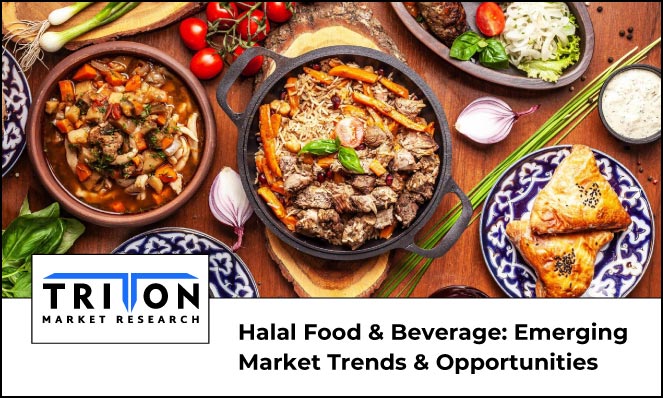



15, March 2024

Halal refers to products and services that adhere to Islamic law. This applies to various aspects of food production, including ingredients, processing, handling, and animal slaughter. Meat and poultry must come from animals slaughtered according to Zabiha guidelines. According to Triton’s research report, the global halal food and beverage market has witnessed substantial expansion in recent years. Estimated at a CAGR of 5.21% over the forecast year 2024-2032, this growth is primarily attributed to two pivotal factors:
With Muslim populations worldwide estimated to be around 2 billion and increasing, demand for authentic halal-certified food and beverages will likely keep rising. The halal food industry follows precise guidelines that determine permissible ingredients and production methods. In this regard, alcohol and pork products are completely prohibited, whereas all additives and ingredients used must be certified halal. Moreover, careful measures must be taken to prevent any cross-contamination during processing, handling, and preparation.
Explore in detail about this market in our FREE sample
The Asia-Pacific region currently accounts for a major share of the global halal food and beverage market. Countries with large Muslim populations, like Indonesia, Malaysia, Pakistan, and Bangladesh, are significant contributors. In addition, exports of halal products from these countries to other Asian nations have also supported the regional market’s growth.
Indonesia’s market, in particular, has expanded, driven by the Indonesian Council of Ulama’s promotion of halal certifications. Supportive government policies towards Islamic finance have enabled success for many new entrants. Besides, the council is the main body issuing halal certifications nationwide. Malaysia also has an established halal food sector with exports to China, Australia, Europe, and the Middle East.
The Asia-Pacific halal food & beverage market is expected to see steady growth as rising incomes in Muslim communities spur demand for quality halal offerings. Multinational food companies are also launching dedicated halal product lines to serve this consumer segment.
Within the halal food category, meat products and prepared ready-to-eat meals are highly sought-after. Consumers want quality, affordable meat options that meet Islamic dietary guidelines. In this regard, Poultry, beef, lamb, and goat meat have significant demand provided they come from animals slaughtered per halal protocols.
Packaged & Frozen Halal Products: Prepared meals, frozen food products, and ready-to-eat items are also popular for their convenience and compliance with religious stipulations. Other than this, busy urban lifestyles make such items practical choices, further widening the market’s scope.
Halal Dairy & Desserts: Bakery items, confectioneries, and dairy products also meaningfully contribute to halal food sales. Specialty breads, cakes, chocolates, cheese, yogurt, ice cream, and dairy beverages appeal to consumers that avoid non-halal additives.
Halal Beverages: Drinks witnessing increased uptake include fruit juices, soft drinks, flavored milk, and energy drinks following halal production standards. Plant-based halal drinks made from soy, almond, oats, rice, etc., represent an emerging segment.
Connect with our experts for a simplified analysis!
Product innovation, new flavors, convenient packaging, and transparency around sourcing and ingredients will differentiate offerings. This is among the key opportunities that companies can leverage moving forward to witness growth in the halal food and beverage market.
Multinational corporations already recognize the potential of Shariah-compliant food products. Moreover, retail chains and restaurants are responding by expanding halal options and certifications to appeal to Muslim consumers. Ultimately, the halal industry is set to become a mainstream fixture serving ethically-minded consumers worldwide.
The key guidelines for Halal food and beverages mandate that the source must not contain any ingredients forbidden by Islamic law. Moreover, the method of slaughter for meat must align with Zabiha requirements, contamination with non-Halal products must be prevented during processing and packaging, and be free from traces of alcohol.
Q2) Which region dominates the global Halal food and beverage market?The Asia-Pacific region dominates the Halal food and beverage market due to the concentration of Muslim-majority countries like Indonesia, Malaysia, Pakistan, and others, with substantial populations actively driving demand.

Prevalent cases of terrorist attacks in today’s world is increasing the need for severe standards of security for public safety, and the global market for biometric technology scrupulously accommoda..
Prevalent cases of terrorist attacks in today’s world is increasing the need for..